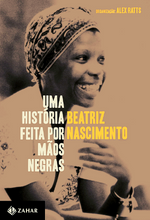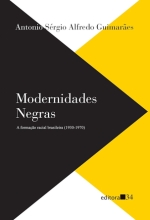Abstract: This work offers a concise overview of Brazilian history, though it is criticized for its lack of depth and detail, particularly in regard to subaltern perspectives. While the work is appealing to casual readers, it does not meet the academic standards for detailed studies. Keywords: History of Brazil, historical synthesis, and brazilian historiography. The […]
Abstract: Tornar-se Negro (Becoming Black), by Neusa Santos Souza, analyzes the identity of black Brazilians on the rise. The work, dense and academic, reveals the emotional and racial challenges faced, offering a critical and enlightening view of the complexities of black identity in Brazil. Keywords: Black identity, racism, and emotional challenges. In her work Tornar-se
Abstract: Sergipanidades, by Chiquinho do Além Mar and Denio Azevedo, offers an intriguing exploration of Sergipe’s identity through string verses and literary essays. While the book is highly valued for its educational approach and diverse illustrations, it has been the subject of some criticism for historical inaccuracies, a lack of explicit definition of identity, and
Abstract: Published by Duke University Press Books in 2018, On decoloniality: concepts, analytics and praxis, by Catherine Walsh and Walter Mignolo, presents decoloniality as a concept, analysis and practice against modernity/coloniality. Critics point out that the segments could be more integrated to enrich the dialog between the authors. Keywords: Decoloniality, modernity/coloniality, and decolonial practices. On
Absgract: History of Artificial Intelligence: 23rd Century by Michael R. Santos explores the evolution of AI. Despite the aim of making the subject accessible, the book is criticized for its complexity and futuristic approach, which can confuse readers without prior knowledge, limiting its target audience. Keywords: Artificial Intelligence, Computing, Robot. The History of Artificial Intelligence:
Abstract: História Oral: diálogos com a obra de Alessandro Portelli no Brasil, edited by Telma Bessa Sales and Antonio Jeferson Lins de Freitas in 2021, examines the methodology of oral history. Published digitally by SertãoCult, it emphasizes marginalized narratives, paying homage to Portelli. This work is an indispensable resource for anyone engaged in research on
Abstract: História oral como arte de escuta, by Alessandro Portelli, discusses the methodology of oral history in relation to memory, trauma and war. It stands out for its dialogical analysis between narrator and historian, but requires prior knowledge of Rome. Recommended for students of history, memory and research methodology. Keywords: Oral History, interviews, and research
Abstract: This text analyzes the literature on aesthetic literacy and the teaching of history, focusing on the construction of Brazilian national identity through 19th century works of art. The author reviewed theses and dissertations, highlighting the importance of teaching teachers and students to understand visual language in order to better interpret these works. The study
Abstract: Published by Duke University Press Books in 2018, On decoloniality: concepts, analytics and praxis, by Catherine Walsh and Walter Mignolo, presents decoloniality as a concept, analysis and practice against modernity/coloniality. Critics point out that the segments could be more integrated to enrich the dialog between the authors. Keywords: Decoloniality, modernity/coloniality, and decolonial practices. On
Abstract: This dossier of the journal Crítica Historiográfica explores Post-Abolition and Race Relations in Brazil. It brings together critical reviews that address the black experience, racism, and anti-racism. Contributions from various Brazilian universities illuminate themes such as structural racism, whiteness, and historical resistance. The aim is to deepen the understanding of racial complexities in the Americas.
Post-Abolition and Race Relations Read More »
Abstract: Sueli Carneiro’s Dispositivo de Racialidade applies Michel Foucault’s concepts to the phenomenon of Brazilian raciality, exploring epistemicide and state genocide. The book reports on the resistance of black activists, discusses education and ethics, and challenges Eurocentric perspectives while highlighting the fight against systemic racism in Brazil. Keywords: Raciality device, racism, and epistemicide. Sueli Carneiro,
Abstract: Uma história feita por mãos negras: Relações raciais, quilombos e movimentos, organized by Alex Ratts, explores the works of Beatriz Nascimento on race relations and quilombos in Brazil. The work retells Brazilian history through a black perspective, criticizing European theories and highlighting the importance of the black narrative. Keywords: Race Relations, Quilombos, Blacks. The
Abstract: Pacto da Branquitude, by Cida Bento, published in 2022, addresses racial discrimination in Brazil, analyzing white supremacy and its effects. The work stands out for its accessible language and focus on racial and gender equity, and criticizes the system, despite presenting certain information gaps. Keywords: Whiteness, Racial Equity, Racism. Pacto da Branquitude is a
Abstract: Modernidades negras: a formação racial brasileira (1930–1970), by Antônio Sérgio Alfredo Guimarães, analyzes Brazilian racial formation (1930-1970) focusing on black intellectuality and racism in its ideological configuration. The work, criticized for limiting black agency and emphasizing white influences, is seen as partially successful in achieving its objective of reflecting on Brazilian social thought, being












